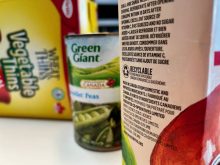“Once an event has been approved it’s not a question when that event will show up, it’s a question of what day on the calendar it will show up.”
– DENNIS STEPHENS
Governments must agree on tolerances for small amounts of genet i -cally modified plants (GM) in commodity shipments and Canada’s should take the lead, says Dennis Stephens, who oversees the Canada Grains Council.
“Once developed it could be used as a model for other countries,” he said in an interview last week. “Canada is in a unique position because not only are we significant (crop) exporters we’re also significant importers.”
Read Also

Ag Days Gives Back 2026 focuses on fire response
Manitoba Ag Days charitable program, Ag Days Gives Back, returns for 2026 with a new wave of rural community support in Manitoba and southeast Saskatchewan
Canada’s flax industry is still reeling in the wake of the European Union’s (EU) claim that two shipments of Canadian flax contained very low levels (one in 10,000 seeds) of genetically modified CDC Triffid flax.
While the GM trait in CDC Triffid was approved in Canada and the United States, it has not been approved in the EU. CDC Triffid was registered in Canada in 1998 but the variety was never commercialized. It was deregistered in 2001 following pressure from flax growers who feared the variety could disrupt access to the EU, their biggest customer, accounting for 60 per cent of their exports.
TEST RESULTS PENDING
Canadian authorities still hadn’t completed their tests of the allegedly contaminated flax at press time. But even if they verify the EU’s findings, there wouldn’t be a problem if the EU allowed grain and oilseed shipments to contain one or even one-half per cent unapproved GM traits, Stephens said.
“The challenge that we have is that governments must realize zero thresholds are impossible for any (GM) event that has been authorized by any country,” he said.
“Once an event has been approved, it’s not a question of when that event will show up, it’s a question of what day on the calendar it will show up.”
It doesn’t matter if crops are shipped in containers through “identity-preserved” programs; small amounts will show up in other crops through the grain-handling system, volunteer crops, pollen flow, or even in seed supplies, he said.
CDC Triffid’s developer, Alan McHughen agrees zero tolerance is impractical.
“There’s a disconnect there and it’s very sad,” said McHughen, a plant biotechnologist at the University of California, Riverside. “Notwithstanding the losses to our farmers (due to lost EU markets) there are unnecessary losses to consumers in Europe and the whole (flax) industry.”
UNLIKELY POSSIBILITIES
McHughen said it’s odd CDC Triffid would suddenly show up in Canadian exports years after the seed was recalled and it was deregistered. “That indicates to me that it wasn’t just sloppiness in the seed supply,” he said.
“Clearly something happened, but no matter the explanation, it was an extremely remote possibility.”
It’s possible one or more seed growers kept some CDC Triffid.
Although highly unlikely, McHughen said sabotage is another possibility. “Activists aren’t above taking a handful of seed from somewhere and throwing it in a bin knowing it’s going to be tested and cause trouble that way,” he said.
Stephens said progress was made in July 2008 towards setting GM tolerances. The United Nations’ Codex Alimentarius Commission agreed to adopt guidelines governments could use to assess risk when establishing tolerances. The fact the EU played an important role in developing the guidelines was encouraging, he added. But so far only the Philippines has announced plans to introduce it.
Canadian flax hasn’t been the only casualty of the EU’s zero GM tolerance; U. S. shipments of soybean meal contaminated with GM corn dust have also been sidelined.
NON-TARIFF BARRIERS
Not setting tolerances is tantamount to a non-tariff trade barrier, Stephens said. It also threatens food security in some countries that rely on imports, he said.
The Plant Biotechnology Institute in Saskatoon, one of the Canadian laboratories investigating the alleged contamination from GM flax, is developing an “event-specific” test to specifically identify CDC Triffid, said Barry Hall, president of the Flax Council of Canada. It’s taking longer than hoped, but it will pay off, he said.
“The industry will be doing large-scale sampling to try and pinpoint what happened where and how,” Hall said. “If they have an event-specific test then the cleaning of the samples (to remove traces of GM traits from other crops) won’t be as critical.” [email protected]















